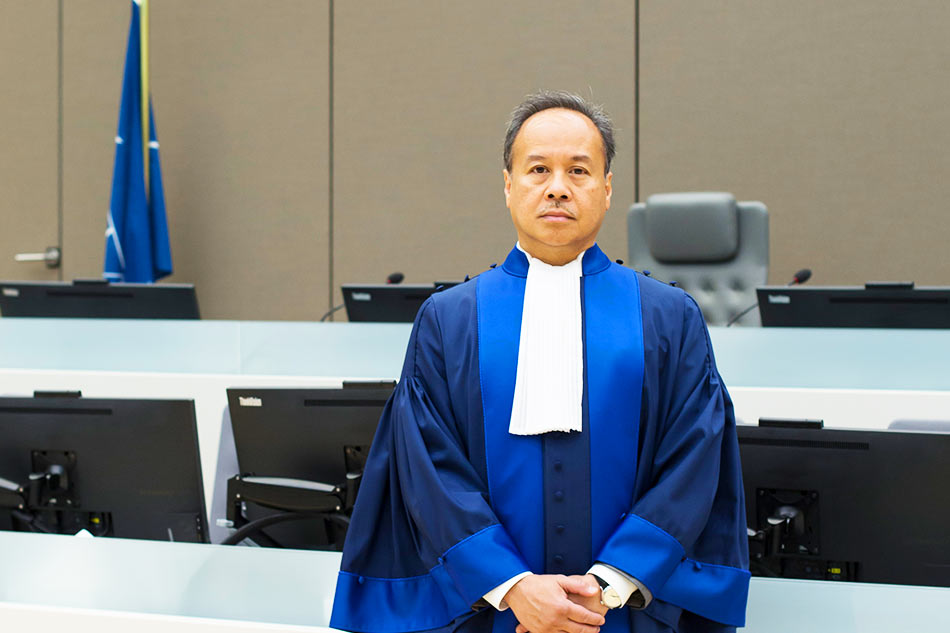Just-retired Filipino ICC judge on ending impunity — ‘Much remains to be done’ | ABS-CBN

Welcome, Kapamilya! We use cookies to improve your browsing experience. Continuing to use this site means you agree to our use of cookies. Tell me more!
Just-retired Filipino ICC judge on ending impunity — ‘Much remains to be done’
Just-retired Filipino ICC judge on ending impunity — ‘Much remains to be done’
ABS-CBN News
Published May 30, 2021 12:29 AM PHT
MANILA—A Filipino judge whose term at the International Criminal Court just ended said it was an honor to represent the country at the Netherlands-based tribunal, and that "much remains to be done" to end impunity worldwide.
MANILA—A Filipino judge whose term at the International Criminal Court just ended said it was an honor to represent the country at the Netherlands-based tribunal, and that "much remains to be done" to end impunity worldwide.
Raul Cano Pangalangan retired from the ICC after serving there for nearly 6 years.
Raul Cano Pangalangan retired from the ICC after serving there for nearly 6 years.
The Court in The Hague has said that while Pangalangan's term of office ended on March 10, he worked until May 16 "to finish ongoing proceedings" in accordance with the Rome Statute.
The Court in The Hague has said that while Pangalangan's term of office ended on March 10, he worked until May 16 "to finish ongoing proceedings" in accordance with the Rome Statute.
In a statement released on Friday, the former University of the Philippines Law dean said he was honored with the opportunity to work with the world's only permanent war crimes tribunal.
In a statement released on Friday, the former University of the Philippines Law dean said he was honored with the opportunity to work with the world's only permanent war crimes tribunal.
ADVERTISEMENT
"Impunity leaves a gap in our moral universe where persons can commit horrendous crimes and still move about casually, unchastised and unpunished, as if they owed no debt to their victims and the world. ICC closes that gap," Pangalangan was quoted as saying by the ICC.
"Impunity leaves a gap in our moral universe where persons can commit horrendous crimes and still move about casually, unchastised and unpunished, as if they owed no debt to their victims and the world. ICC closes that gap," Pangalangan was quoted as saying by the ICC.
Former #ICC judge Raul Cano Pangalangan reflecting on his mandate ⤵️ pic.twitter.com/M9hEPEDMm6
— Int'l Criminal Court (@IntlCrimCourt) May 28, 2021
Former #ICC judge Raul Cano Pangalangan reflecting on his mandate ⤵️ pic.twitter.com/M9hEPEDMm6
— Int'l Criminal Court (@IntlCrimCourt) May 28, 2021
Pangalangan added there was still a lot to accomplish in the world's justice system.
Pangalangan added there was still a lot to accomplish in the world's justice system.
"It has been a distinct honor for me as a Filipino to have taken part in its noble work. Much remains to be done, and I am confident that the next generation of ICC advocates will continue to keep that dream alive," he said.
"It has been a distinct honor for me as a Filipino to have taken part in its noble work. Much remains to be done, and I am confident that the next generation of ICC advocates will continue to keep that dream alive," he said.
The Filipino judge started his stint with the ICC on July 13, 2015, after being elected on June 24 the same year from the Asian Group of States, according to the court.
The Filipino judge started his stint with the ICC on July 13, 2015, after being elected on June 24 the same year from the Asian Group of States, according to the court.
According to UP's website, Pangalangan served as president of ICC's trial division and was a presiding judge on an ICC case regarding the war crime of assaulting cultural and religious heritage.
According to UP's website, Pangalangan served as president of ICC's trial division and was a presiding judge on an ICC case regarding the war crime of assaulting cultural and religious heritage.
He also contributed as an author to the Commentary on the Rome Statute of the International Criminal Court and also holds a Diplôme of The Hague Academy of International Law.
He also contributed as an author to the Commentary on the Rome Statute of the International Criminal Court and also holds a Diplôme of The Hague Academy of International Law.
Pangalangan studied law at UP.
Pangalangan studied law at UP.
He took the Bar in 1984, where he got a grade of 83.8 percent.
He took the Bar in 1984, where he got a grade of 83.8 percent.
He was the dean of the UP College of Law for two terms, from 1999 to 2005.
He was the dean of the UP College of Law for two terms, from 1999 to 2005.
He took his master’s and doctorate at Harvard University, where he became a visiting professor in 1998 and 2007.
He took his master’s and doctorate at Harvard University, where he became a visiting professor in 1998 and 2007.
Established by the Rome Statute in 2002, the ICC is a court of last resort to prosecute war crimes, crimes against humanity and genocide when a country is unable or unwilling to do so. — With a report from Reuters
Established by the Rome Statute in 2002, the ICC is a court of last resort to prosecute war crimes, crimes against humanity and genocide when a country is unable or unwilling to do so. — With a report from Reuters
RELATED VIDEO:
Read More:
International Criminal Court
ICC
Raul Pangalangan
The Hague
international court
justice system
ANC
ANC Top
ADVERTISEMENT
ADVERTISEMENT


